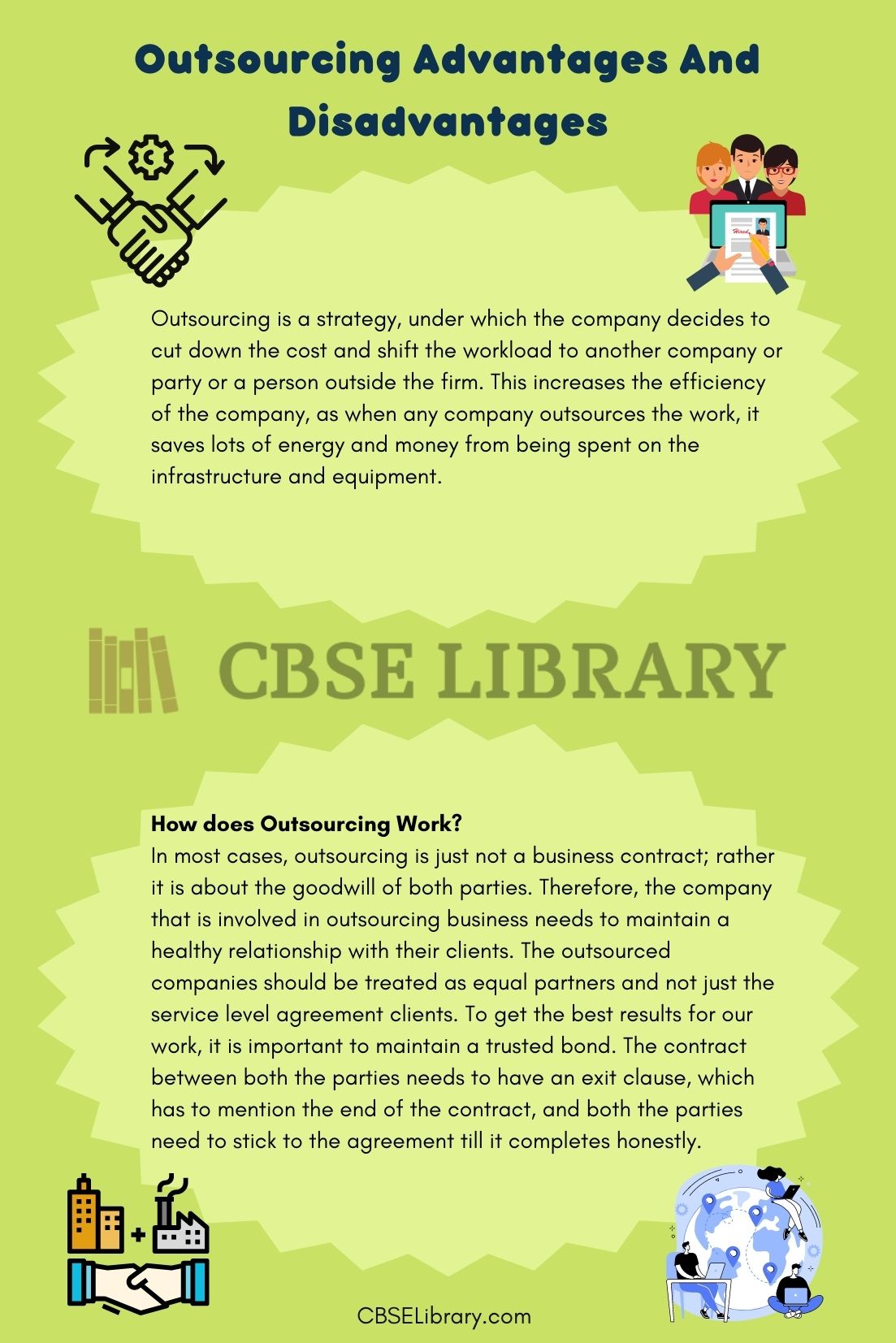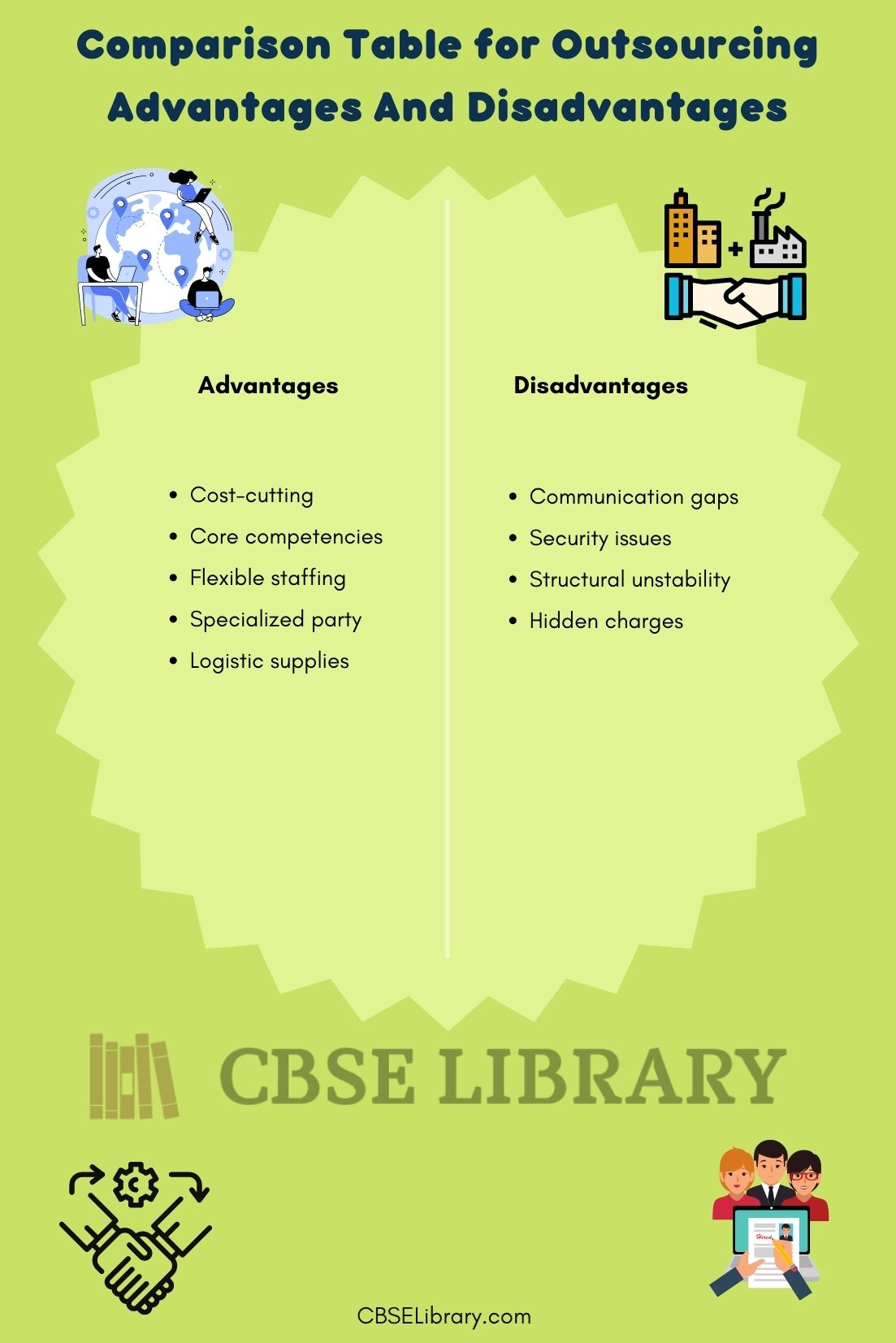Outsourcing Advantages And Disadvantages: Outsourcing is also known as the ‘third party. Outsourcing is a practice in a business environment where the company hires people outside the company and delegates the task to them. It could be some paperwork, some services, or any other type of work, which is original to be performed by the parent company but is assigned to a person or a party outside the company. Initially, the outsourcing task was prominent in the manufacturing and FMCG industry, but today; even the big software companies and other types of goods and services sectors have included the outsourcing model in their working style.
Students can also find more Advantages and Disadvantages articles on events, persons, sports, technology, and many more.
What is Outsourcing? What are the Advantages And Disadvantages Of Outsourcing?
Outsourcing is a strategy, under which the company decides to cut down the cost and shift the workload to another company or party or a person outside the firm. This increases the efficiency of the company, as when any company outsources the work, it saves lots of energy and money from being spent on the infrastructure and equipment.
Rather, that money can be used to invest in the company’s research and development and growth. So, outsourcing in simpler words means getting the company’s job done by the non-employees within the boundaries of the company. This third-party working process involves big consultancy firms like IBM and some BPOs too to hire temporary workers to provide them with contact-based jobs.
- Advantages of Outsourcing
- Disadvantages of Outsourcing
- Comparison Table for Outsourcing Advantages And Disadvantages
- FAQ’s on Outsourcing Advantages And Disadvantages
Types Of Outsourcing
The practice of outsourcing has become very common these days and is done by almost all types of industries. There are many types to outsource the business, and different companies choose different options according to their preferences. Based on the proximity between two sources, outsourcing can be classified broadly into three types-
- Onshoring: This means the delegation of work to lower-cost locations, nearby the company’s premises or within the country.
- Nearshoring: This means the delegation of work to the party or individual nearby places.
- Offshoring: This means the delegation of work to the contract-based people overseas.
Some common fields that include the outsourcing work include- Content writing, Computer programming services, Tax compliance, Finance, Human resource management, Accounting, Supply chain management, Engineering, Customer support service, Marketing, Research, and design.
How does Outsourcing Work?
In most cases, outsourcing is just not a business contract; rather it is about the goodwill of both parties. Therefore, the company that is involved in outsourcing business needs to maintain a healthy relationship with their clients. The outsourced companies should be treated as equal partners and not just the service level agreement clients. To get the best results for our work, it is important to maintain a trusted bond. The contract between both the parties needs to have an exit clause, which has to mention the end of the contract, and both the parties need to stick to the agreement till it completes honestly.
Reasons for Outsourcing
Outsourcing is mostly done to cut down the extra cost, increase the efficiency of working and pump up the speed of work. The companies who depend on outsourcing-based work; have a strong and reliable partner with them to get the benefits and profits on both sides. The central idea behind doing so is to find the best outsourcing company that can perform the assigned task efficiently, sincerely, and faster, and of course, the important part, is whether it will be able to do it at a cost lesser than the company or not.
Companies often decide to outsource ancillary functions within their businesses to focus their resources exclusively on their commensurateness, helping them gain a competitive advantage in the marketplace. Some companies outsource their work to release their workload and also don’t want to hire in-house candidates or full-time employees with experience and skills.

Advantages of Outsourcing
- Cost-cutting: Outsourcing helps to lower the cost to a wide range. If a company isn’t willing to set up a big infrastructure at a place and wants to reduce the labor costs then it may choose to go to outsourcing the project. This would be even cheaper than the full-time employees. Not even the project but the operational tasks can also be outsourced at the minimum wages.
- Core competencies: Outsourcing is the best option for the startup models. Outsourcing the existing project to a third party helps to expand the company by taking more that helps the team to focus on new projects.
- Flexible staffing: Outsourcing helps in the expansion of the work and reduces the labor cost to a wide extent. Also, it is a great option to hire the candidates outside temporarily on contract when the demand for candidates is high, rather than permanently hiring.
- Specialized party: It is indeed a good idea to train a new technology to the existing candidates in the company and get them ready for the upcoming projects. But it is an even better idea, to get an already trained and experienced person in a specific field. It will save time and money both.
- Logistic supplies: In the case of online retail markets, the outsourced candidates are and should be preferred because there are quite many chances of unavailability of the existing company’s candidates all the time.
Disadvantages of Outsourcing
- Communication gaps: Outsourcing where on the other hand is extremely beneficial in terms of logistic supplies, we have to agree that the addition of another party brings in the communication too, which may create sometimes gaps or miscommunication, especially in the initial times.
- Security issues: The company, be it a small or a big scale company, security is always a matter of concern and it should be. Allowing the outsider into the company and providing access to the working style and system is quite vulnerable.
- Structural instability: There is no doubt that the outsourcing company will always flourish. Due to any type of reason, the company may go down and with the internal staff, the external staff may too get affected.
- Hidden charges: Just like the terms and conditions, there are hidden charges from the outsourcing company too such as the last-minute charges, and emergency charges, which are not open at the time of the contract.
Comparison Table for Outsourcing Advantages And Disadvantages
| Advantages | Disadvantages |
| Cost-cutting | Communication gaps |
| Core competencies | Security issues |
| Flexible staffing | Structural instability |
| Specialized party | Hidden charges |
| Logistic supplies |

FAQ’s on Outsourcing Advantages And Disadvantages
Question 1.
What can be the problems in outsourcing?
Answer:
Outsourcing can result in different kinds of problems like the candidates hired could be lacking in experience and expertise. Lack of sincerity may lead to the downfall of the project too.
Question 2.
Is outsourcing necessary?
Answer:
No, Outsourcing solely depends on the TL or the company head if he/she wishes to cut down the cost of the company, improve the working efficiency and expand itself.
Question 3.
How can outsourcing help companies?
Answer:
There are several levels of projects in a company. Outsourcing the least important work so that the internal staff can focus and work efficiently on bigger projects.
Question 4.
Is BPO a type of Outsourcing?
Answer:
BPO stands for Business Process Outsourcing which in itself is a type of consultancy that provides outsourcing opportunities to different big companies.
